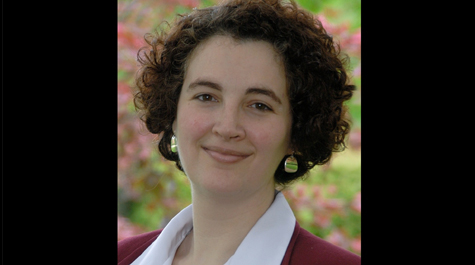Erin Ryan Balances Federalism, Environmentalism, and Music
Sitting in on one of Erin Ryan's classes on negotiation, natural resources law, or property law, one wouldn't necessarily guess that this associate professor at William & Mary Law School is also an accomplished musician, vocalist, and former forest ranger. But Ryan is all that, and more.
Ryan's first book, Federalism and the Tug of War Within, will be published by Oxford University Press in 2011. In it, she explores the implications of federalism theory for governance in contexts of jurisdictional overlap, and the implications of multijurisdictional governance for federalism theory itself. Federalism theory, she argues, must do more to reconcile the tensions in these contexts between the underlying values that give federalism meaning: (1) checks and balances that protect individual rights against government excess, (2) governmental accountability that ensures meaningful democratic participation, (3) local autonomy that fosters interjurisdictional innovation, and (4) regulatory synergy between the unique capacities of local and national government for coping with problems that draw on both.
"The book traces how the Supreme Court has struggled to reconcile these competing values that undergird American federalism, with real consequences for governance that requires local and national collaboration," Ryan said. Drawing examples from the failed response to Hurricane Katrina and other problems that implicate both local and national regulatory authority, she argues that the philosophy of federalism behind the Rehnquist Court's decisions can inhibit effective interjurisdictional governance. And she proposes a contrasting theoretical model.
"The book shows how the Rehnquist Court's New Federalism approach exalts checks and balances over all competing federalism considerations - especially problem-solving synergy - inserting a false dichotomy into the very meaning of federalism," she explained. "The New Federalism's stylized understanding of the line between state and federal power suggests only two options - either we honor the Constitution and stand guard over that line, or we blur it to solve problems at the risk of constitutional values. But a fuller understanding of American federalism rightly allows us to do both." "There is no bright line to blur;" she underscored, "just an interjurisdictional gray area between clearer realms of state and federal prerogative, where federalism tensions are heightened."
Ryan uses Hurricane Katrina as a particularly tragic example of failed governance exacerbated by this philosophy, but she added, "less mediagenic examples abound, including the management of stormwater pollution, the equitable disposal of low level radioactive waste, wetlands protection, and the protection of the nation against terrorist attack. The comparatively pragmatic cooperative federalism model affords more balance between competing federalism values, but is undertheorized, and critiqued by New Federalism proponents as providing insufficient checks."
Her solution, a theory of "Balanced Federalism," better mediates between opposing federalism values and provides greater guidance for judicial review and regulatory decision-making in contexts of jurisdictional overlap. It acknowledges the important roles that the political branches can play in navigating federalism through intergovernmental bargaining, and proposes both substantive and procedural standards of judicial review for federalism challenges to various forms of interjurisdictional governance. The Balanced Federalism framework, Ryan said, would foster a healthier dialectic between the various federalism values that, "though in tension with one another, have made our system of government so effective and enduring."
 Ryan earned a bachelor's degree in East Asian languages and civilizations from Harvard-Radcliffe College. Love of music and performance then led her to Wesleyan University to study world music and ethnomusicology. Her master's thesis, entitled "Pan on the Verge of the 21st Century," explored Trinidadian steelbands and post-colonial identity.
Ryan earned a bachelor's degree in East Asian languages and civilizations from Harvard-Radcliffe College. Love of music and performance then led her to Wesleyan University to study world music and ethnomusicology. Her master's thesis, entitled "Pan on the Verge of the 21st Century," explored Trinidadian steelbands and post-colonial identity. "During my field research for my master's degree, I specialized in Afro-Caribbean music, primarily Trinidadian steelband and West African percussion," Ryan said. "I co-instructed the undergraduate steel drum program at Wesleyan, and taught private voice lessons. I also had the amazing opportunity to play cello pan with the Trintoch Invaders in Trinidad during Carnival season."
Ryan's musical résumé also includes touring the East Coast in a steel drum band, which played on stages from community gardens to Lincoln Center. In addition, she performed as a vocalist, guitarist, and percussionist in a variety of venues and recordings, and fronted an all-female, jazz-influenced folk-pop quintet. When asked if she had a favorite gig, she responded: "opening for Queen Latifah was fun!"
It was during the next chapter in her life, when she worked as a forest ranger on the Mono Lake District of California's Inyo National Forest, that she was exposed to some of the issues that intrigue her today as a law professor. "As a forest ranger," she said, "some complex land use and natural resource problems fully initiated me into the world of interjurisdictional legal disputes. Environmental problems uniquely challenge the New Federalism model, often calling simultaneously for federal boundary-crossing authority and state land-use authority."

Ryan said that earlier chapters of her life have provided a rich foundation for her work today.
She went on to study law at Harvard, where she was a Hewlett Negotiation Research Fellow at the Harvard Program on Negotiation. Summer positions at the Conservation Law Foundation, Jenner & Block, and the State Department's Office of the Legal Advisor for Oceans, Environment and Science helped further hone her interests in negotiation and environmental advocacy. After earning her J.D., she clerked for Judge James R. Browning on the U.S. Court of Appeals for the Ninth Circuit. She practiced environmental, land use, and local government law in San Francisco and taught negotiation at the University of California, Hastings College of Law before joining the W&M Law faculty in 2004.
"You might wonder," she said, "how ethnomusicology could possibly relate to the teaching and research of law. In fact, studying ethnomusicology taught me how to read cultural texts, and prepared me to understand the ways in which law is also a cultural text. My work with the Forest Service propelled me deeply into environmental law and natural resources management, and I loved my work there. But I eventually left for law school when I decided it was important for more people with field experience to participate in the making of policies that they understand from actually implementing them on the ground."
"It's been extremely gratifying," Ryan continued, "to be able to do that through my research here at William & Mary Law School -- and to be able to share what I have learned with my wonderful students, who teach me just as much in return. Sometimes I miss waking up at 7,000 feet, and I often miss making music as I once did, but I wouldn't trade my job as a law professor for the world."
